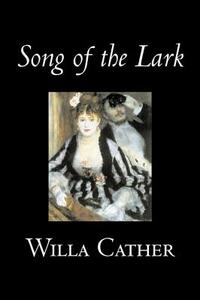Take a photo of a barcode or cover
5 reviews for:
Song of the Lark by Willa Cather, Fiction, Short Stories, Literary, Classics
Willa Cather
5 reviews for:
Song of the Lark by Willa Cather, Fiction, Short Stories, Literary, Classics
Willa Cather
"Yes," she reflected, as the taxi cut into the Park carriage road, "we don't get fairy tales in this world....
I began this with high hopes, having adored the third book from Cather's Great Plains trilogy, [b:O Pioneers!|140963|O Pioneers! (Great Plains Trilogy, #1)|Willa Cather|https://images.gr-assets.com/books/1388956566s/140963.jpg|467254]. While this was entertaining enough and the first half didn't lack for too much, the second half neglected me altogether.
The beauty of Cather’s writing is there, the gorgeous way she captures the landscape and its people in her net of words—pragmatically beautiful, but some of the story was missing and thin. Thea, the main character and a musical talent, had all of the flight of a dreamer but Cather misplaced her anchor and the plot lacked a little for it.
It was in that second half that I didn't feel the great current of life running through it and pulling me along. No place, no person, no time. Instead, I felt too much of the author’s movements and knowledge. Like Cather waggled and then flexed her fingers before writing the last 15% to say, Look how I impress you with my opera prowess. While the first half felt like a Cather novel to me, as though you simply plucked a fragment from the timeline of life and examined it, the second half felt more directed and sculpted for a purpose.
Artistic growth is, more than it is anything else, a refining of the sense of truthfulness. The stupid believe that to be truthful is easy; only the artist, the great artist, knows how difficult it is.
The thing that seemingly elevates this work is Cather's understanding of truly talented people and her ability to translate that into words with a time, place, and characters. Once again, Cather does create a force of a main character, a woman to be reckoned with, and she stays true to that character throughout. She creates situations for Thea to help the reading audience understand her better, understand and make sense of the choices she makes. For instance, her choices about marriage and how it fits into her vision of herself and her future—especially the future for her career.
This story attempts to deal only with the simple and concrete beginnings which color and accent an artist's work, and to give some account of how a Moonstone girl found her way out of a vague, easy-going world into a life of disciplined endeavor.
Ultimately, I felt a great imbalance here that never righted itself. Thea was all push, push, push, and soar, soar, soar—never really leaving me with the impression of living, making her feel a little one-sided and two-dimensional. While this was a perfectly fine book, well -sculpted and -executed, I cannot but help feel the blow my expectations took against this one. I wanted more for Thea. More of something—anything. If she was to succeed in all aspects of life, great! But succeed proudly and loudly and fully. If she was to fail in some aspects in order to make the sacrifice for her career, fine. But show more of the sacrifices and make me feel Thea's pain, even if it's just for a while. There seemed to be no price fully paid...an unreconciled account of a talented Moonstone girl.
I began this with high hopes, having adored the third book from Cather's Great Plains trilogy, [b:O Pioneers!|140963|O Pioneers! (Great Plains Trilogy, #1)|Willa Cather|https://images.gr-assets.com/books/1388956566s/140963.jpg|467254]. While this was entertaining enough and the first half didn't lack for too much, the second half neglected me altogether.
The beauty of Cather’s writing is there, the gorgeous way she captures the landscape and its people in her net of words—pragmatically beautiful, but some of the story was missing and thin. Thea, the main character and a musical talent, had all of the flight of a dreamer but Cather misplaced her anchor and the plot lacked a little for it.
It was in that second half that I didn't feel the great current of life running through it and pulling me along. No place, no person, no time. Instead, I felt too much of the author’s movements and knowledge. Like Cather waggled and then flexed her fingers before writing the last 15% to say, Look how I impress you with my opera prowess. While the first half felt like a Cather novel to me, as though you simply plucked a fragment from the timeline of life and examined it, the second half felt more directed and sculpted for a purpose.
Artistic growth is, more than it is anything else, a refining of the sense of truthfulness. The stupid believe that to be truthful is easy; only the artist, the great artist, knows how difficult it is.
The thing that seemingly elevates this work is Cather's understanding of truly talented people and her ability to translate that into words with a time, place, and characters. Once again, Cather does create a force of a main character, a woman to be reckoned with, and she stays true to that character throughout. She creates situations for Thea to help the reading audience understand her better, understand and make sense of the choices she makes. For instance, her choices about marriage and how it fits into her vision of herself and her future—especially the future for her career.
This story attempts to deal only with the simple and concrete beginnings which color and accent an artist's work, and to give some account of how a Moonstone girl found her way out of a vague, easy-going world into a life of disciplined endeavor.
Ultimately, I felt a great imbalance here that never righted itself. Thea was all push, push, push, and soar, soar, soar—never really leaving me with the impression of living, making her feel a little one-sided and two-dimensional. While this was a perfectly fine book, well -sculpted and -executed, I cannot but help feel the blow my expectations took against this one. I wanted more for Thea. More of something—anything. If she was to succeed in all aspects of life, great! But succeed proudly and loudly and fully. If she was to fail in some aspects in order to make the sacrifice for her career, fine. But show more of the sacrifices and make me feel Thea's pain, even if it's just for a while. There seemed to be no price fully paid...an unreconciled account of a talented Moonstone girl.
Willa Cather wrote a compelling, vivid novel about the trials and tribulations of a young woman striving to be an artist. The protagonist faced numerous obstacles, born and raised in a small old fashioned town on the plains of Colorado, in the latter part of the 19th century. Thea--the main character--possessed musical abilities and a special something which spurred her on to further her education. On her path of self-improvement, she met several male mentors who supported and assisted her endeavors.
The vivid descriptions of setting were most memorable. Cather's character development was superb, as well. The reader realizes that the story is in part autobiographical, though Thea found fame and fortune as an opera singer; Willa Cather, a strong and independent female, encountered roadblocks to her career. She was compelled to leave her town of origins to find stimulation and education.
The vivid descriptions of setting were most memorable. Cather's character development was superb, as well. The reader realizes that the story is in part autobiographical, though Thea found fame and fortune as an opera singer; Willa Cather, a strong and independent female, encountered roadblocks to her career. She was compelled to leave her town of origins to find stimulation and education.
Willa Cather remains one of my favorite authors. This was absolutely beautiful - particularly the descriptions of Chicago, Moonstone, and Arizona. Song of the Lark felt more dated than O, Pioneers! or My Antonia but I appreciated Thea’s character and artistry enormously.
Read for my Deep Mapping seminar class.
I don’t know how to rate this. The beginning is not good, the middle is amazing, and the ending is good.
The Song of the Lark has some of the most beautiful quotes I have ever had the pleasure of reading. The way Cather describes nature and her characters interacting with nature is divinely moving and comforting.
With that being said, the beginning of the novel is strange and nothing much happens for the first one hundred pages. Once Thea makes is out of her hometown of Moonstone, Colorado and to the lights and high society of Chicago, things pick up. From Chicago she travels to other rural and urban locations to inspire herself.
I love the juxtaposition within Thea; she is a country girl with a great singing talent but she yearns for the big city to begin her career. She goes back and forth with finding inspiration within nature and rurality to feeling suffocated by it.
We see Thea grow from a twelve year old with a gift to a renowned opera singer known from Europe to New York City. Loved by many men, Thea stayed single in pursuit of her passionate artistry. That fact is definitely a unique one in the late 1890s when the story is supposed to take place.
I will likely read Cather again in the future. My professor recommends The Professor’s House.
I don’t know how to rate this. The beginning is not good, the middle is amazing, and the ending is good.
The Song of the Lark has some of the most beautiful quotes I have ever had the pleasure of reading. The way Cather describes nature and her characters interacting with nature is divinely moving and comforting.
With that being said, the beginning of the novel is strange and nothing much happens for the first one hundred pages. Once Thea makes is out of her hometown of Moonstone, Colorado and to the lights and high society of Chicago, things pick up. From Chicago she travels to other rural and urban locations to inspire herself.
I love the juxtaposition within Thea; she is a country girl with a great singing talent but she yearns for the big city to begin her career. She goes back and forth with finding inspiration within nature and rurality to feeling suffocated by it.
We see Thea grow from a twelve year old with a gift to a renowned opera singer known from Europe to New York City. Loved by many men, Thea stayed single in pursuit of her passionate artistry. That fact is definitely a unique one in the late 1890s when the story is supposed to take place.
I will likely read Cather again in the future. My professor recommends The Professor’s House.
The subject was interesting to me, as my husband is a singer. He would probably be much more familiar with some of the German lyrics the main character sings in her career. I've encouraged him to read it, too!



